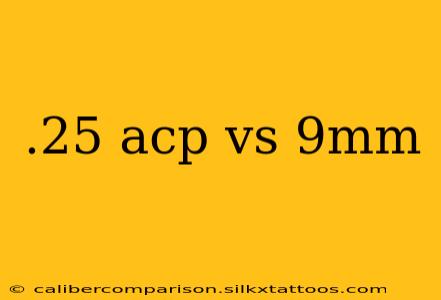Choosing the right caliber for self-defense or concealed carry is a crucial decision, demanding careful consideration of various factors. This in-depth comparison of the .25 ACP and 9mm cartridges will help you understand their strengths and weaknesses, ultimately guiding you towards a more informed choice.
Ballistics and Power: A Stark Contrast
The most significant difference between the .25 ACP and the 9mm lies in their ballistic performance. The .25 ACP, a relatively ancient cartridge, is significantly underpowered compared to the modern 9mm.
.25 ACP:
- Caliber: 6.35mm
- Energy: Low; typically under 100 ft-lbs
- Penetration: Limited; often insufficient to reliably stop a threat.
- Stopping Power: Very low; relies heavily on shot placement for effectiveness.
The .25 ACP's small size and low energy mean it lacks the stopping power necessary for reliable self-defense in most situations. Its limited penetration ability makes it less effective against barriers, such as clothing.
9mm:
- Caliber: 9x19mm Parabellum
- Energy: Moderate to high; ranging from 300-500 ft-lbs depending on the load.
- Penetration: Moderate to high; capable of penetrating barriers and targets effectively.
- Stopping Power: Significantly higher than .25 ACP; provides a greater chance of incapacitating an attacker.
The 9mm's higher energy and penetration offer a much greater margin of error, increasing the likelihood of stopping a threat. This is a critical advantage in high-stress self-defense situations.
Recoil and Shootability: Comfort and Control
Another key factor to consider is recoil and shootability. The lighter .25 ACP has significantly less recoil, making it easier for smaller individuals or those new to firearms to handle. However, this ease of handling comes at the cost of reduced power.
.25 ACP:
- Recoil: Very low
- Shootability: Easy to handle, especially for beginners.
9mm:
- Recoil: Moderate; manageable for most shooters with proper technique.
- Shootability: Requires practice and proper technique for comfortable and accurate shooting.
While the 9mm's recoil is more noticeable, it's manageable with practice. The increased power and stopping power often outweigh the slightly increased recoil.
Concealability: Size and Weight
Both calibers are commonly used in concealed carry pistols, but their relative size and weight differ.
.25 ACP:
- Concealability: Excellent; small and lightweight pistols are readily available.
The diminutive size of the .25 ACP allows for extremely easy concealment, making it a viable option for deep concealment situations.
9mm:
- Concealability: Good; although pistols are generally larger and heavier than .25 ACP firearms.
While 9mm pistols are larger, advancements in firearm design have produced increasingly compact and lightweight options suitable for concealed carry.
Ammunition Availability and Cost: Practical Considerations
Ammunition availability and cost are crucial considerations for any firearm owner.
.25 ACP:
- Availability: Generally available, but may be less common than 9mm in some areas.
- Cost: Typically less expensive than 9mm ammunition.
9mm:
- Availability: Widely available and easily sourced.
- Cost: Generally more expensive than .25 ACP ammunition.
The widespread popularity of the 9mm means it's readily available almost everywhere, while .25 ACP ammunition, while available, might be harder to find in certain regions.
Conclusion: The Right Choice Depends on Your Needs
The choice between .25 ACP and 9mm ultimately depends on your individual needs and priorities. The .25 ACP offers excellent concealability and low recoil, making it suitable for individuals prioritizing ease of handling and small size. However, its limited stopping power makes it less than ideal for serious self-defense. The 9mm, despite slightly larger size and more recoil, offers significantly more stopping power and better penetration, making it a far more effective self-defense round. For most users seeking effective self-defense, the 9mm is the superior choice. Consider your comfort level, training, and intended use before making a final decision. Consulting with a firearms expert is always recommended.

